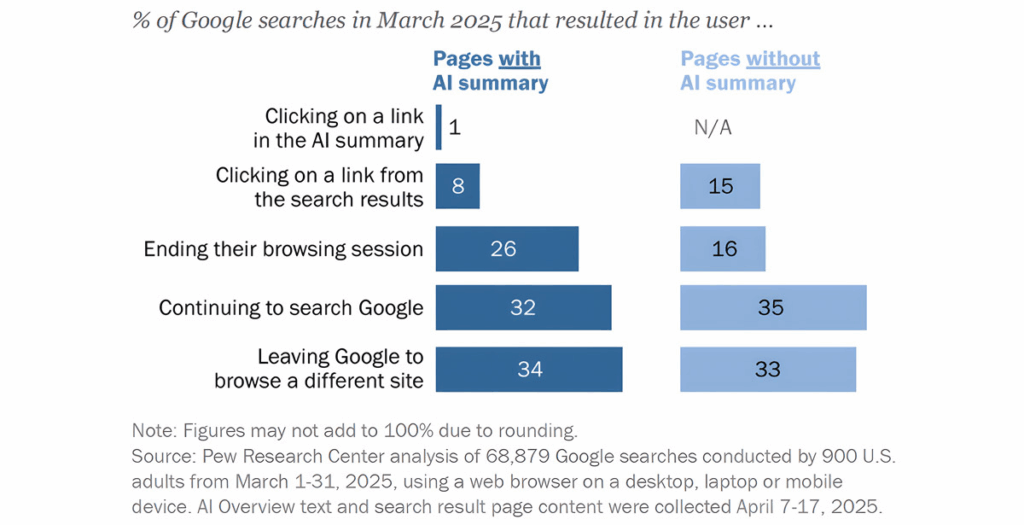? Millions of entrepreneurs around the world spent years mastering one art: how to get their websites to the top of Google. They hired experts, analyzed algorithms, and wrote content according to strict search engine requirements. And suddenly, all these efforts may become useless.
How information search is changing
Try asking any question in Google right now. At the top of the page, a neat block appears with a ready-made answer — no links, no external site visits. Why click further if the answer is already on the screen?

Paradoxically, the fundamental change is not in technology, but in human habits. We are no longer “searching” for information — we are “demanding” it. Google is transforming from a navigator into an oracle: you ask a question, you get an answer.
This transformation is convenient and logical, but it disrupts the traditional mechanism of the information ecosystem. The intermediary link between question and answer disappears. Users no longer browse websites — data materializes directly in front of them.
The end of the click era: marketing in a new reality
When AI began providing direct answers, an entire philosophy of online business collapsed. Previously, success was measured by site traffic — the more clicks, the higher the revenue. Today, clicks disappear because they are no longer needed.
Imagine the owner of a chain of jewelry stores who spent five years promoting an online catalog. Today, a customer asks Google, “Which diamonds are best to buy?” — and receives a complete answer right in search. Why visit the website when all the information is already in front of your eyes?

The multi-billion-dollar digital marketing industry is experiencing an existential shock. Rules that seemed unshakable are being rewritten before our eyes. SEO specialists and online marketing professionals are forced to seek new approaches, whose essence remains unclear even to experienced market players.
Analysts predict that generative AI in search engines could significantly reduce traffic to source websites. For millions of online projects built on attracting audiences through clicks, this is a true death sentence.
News under threat: the collapse of traditional media
News websites are taking the hardest hit. For twenty years, newspapers and magazines learned to survive in the digital world: building websites, mastering social media, developing subscriptions, and learning to monetize advertising. It seemed the worst was behind them.
Statistics from the Pew Research Center and other research organizations show a catastrophic decline in news site traffic.

For media dependent on advertising, this translates into millions of dollars in losses. Google users are increasingly less likely to click links if AI has already provided an answer.
A paradox emerges: journalists spend months investigating corruption, conducting interviews, and fact-checking — yet readers get a distilled summary of their work through automated AI-generated content, often unaware of who produced it.
Newsrooms are massively cutting staff. Local newspapers are closing one by one. Quality journalism, which requires time and resources, gives way to superficial automated summaries. Media experts are already talking about a fatal blow to traditional press: previously, competition was with bloggers and social media; now it’s with the very logic of news consumption itself.
For news websites, this is not a crisis — it is an existential threat. No traffic means no ad revenue, no revenue means no journalists, no journalists means no content. A vicious circle threatens to collapse the entire news production system.
When technology destroys its own creators
The most striking aspect is that Google, through its actions, is dismantling the very business model that generated tens of billions of dollars. The company earned its fortune by connecting users with content — and now eliminates the need for that connection.

This is a classic example of a technological dilemma: to keep up in the AI race, Google must undermine the foundations of its own success. The internet economy ecosystem it built is now being consumed by the very progress it spawned.
Long-term consequences are hard to predict. If content creators stop receiving rewards through website visits, what incentive remains to produce high-quality materials? We may be facing an information crisis: data sources for AI may start to dry up.
? “Revolution devours its own children,” said Danton before his execution. Today, the digital revolution devours Google. The difference is that this time the executioner is not a crowd but progress itself — far more ruthless and unforgiving.
All content provided on this website (https://wildinwest.com/) -including attachments, links, or referenced materials — is for informative and entertainment purposes only and should not be considered as financial advice. Third-party materials remain the property of their respective owners.


